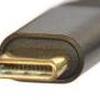In a recent announcement, the USB Forum revealed USB 4 Version 2.0. With 80Gbit/s, the new USB standard is twice as fast as the previous limit. According to the group, 80Gbit/s will also be supported via USB 4 Version 1.0 cables.
The latest version of the universal computer interface, USB4, receives an upgrade. The maximum data transmission rate with USB4 in version 2.0 will be quadrupled to 80 Gbit/s. The protocol improvements should also improve tunneling performance for USB 3.2, DisplayPort, and PCIe.
The USB Group today announced the pending release of the USB4 Version 2.0 specification, a major update to enable up to 80 Gbps of data performance over the USB Type-C® cable and connector. The USB Type-C and USB Power Delivery (USB PD) specifications will also be updated to enable this higher level of data performance. All of these specification updates are expected to be published in advance of this year’s series of USB DevDays developer events planned for November. Protocol updates are also being made to enable higher performance USB 3.2, DisplayPort™ and PCI Express® (PCIe®) data tunneling to best use the higher available bandwidth.
“Once again following USB tradition, this updated USB4 specification doubles data performance to deliver higher levels of functionality to the USB Type-C ecosystem,” said Brad Saunders, USB Promoter Group Chairman. “Solutions seeing the most benefit from this speed enhancement include higherperformance displays, storage, and USB-based hubs and docks.”
Key characteristics of the updated USB4 solution include:
- Up to 80 Gbps operation, based on a new physical layer architecture, using existing 40 Gbps USB Type-C passive cables and newly-defined 80 Gbps USB Type-C active cables.
- Updates to data and display protocols to better use the increase in available bandwidth.
- USB data architecture updates now enable USB 3.2 data tunneling to exceed 20 Gbps.
- Updated to align with the latest versions of the DisplayPort and PCIe specificatio

